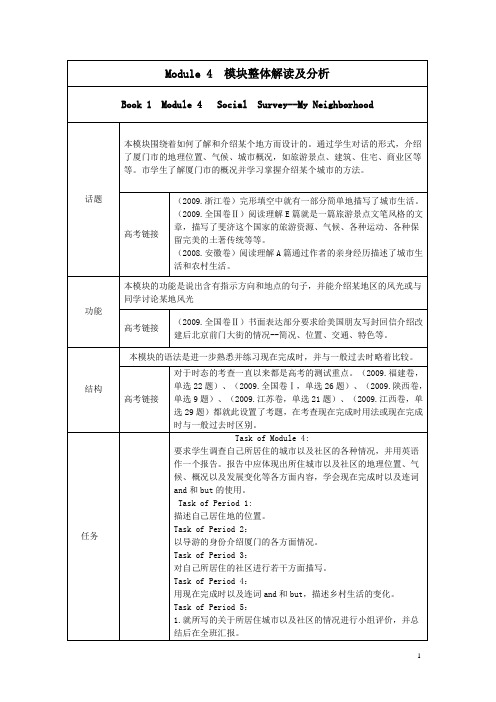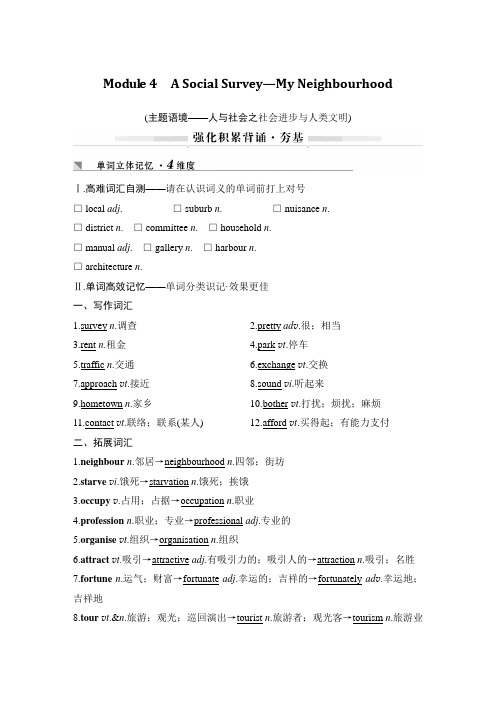Module 4 A Social Survey—My Neighbourhood
- 格式:ppt
- 大小:886.00 KB
- 文档页数:1


Unit 4. A Social Survey—My Neighbourhood一.重点词汇及拓展1.investigation n.调查2.sound vi.听起来3.bother vt.打扰;麻烦 4.approach vt.接近5.exchange vt.交换6.afford vt.买得起,有能力支付7.contact vt.联络;联系(某人)8.fortunate adj.幸运(de);吉祥(de)→unfortunate(反义词)adj.不幸(de)→fortune n.运气9.starve vi.饿死→starvation n.饥饿10.occupation n.职业→occupy v.占据11.fascinating adj.迷人(de);吸引人(de)→fascinate v.使着迷→fascination n.魅力12.survive vi.幸存→survival n.幸存,侥幸活下来13.attracting adj.有吸引力(de)→attract v.吸引→attraction n.吸引力二.重点短语1. as a result 因此,结果2.such as诸如……之类(de)3.go up上升;上涨4.put up建造;张贴5. get away from摆脱6.pay back归还;报复7.a_great_many许多,大量8.so far到目前为止三.重点句型1.It's been six years since we last saw each other...自从上次我们见面以来已有六年了……2.It/This/That is the first time that...这/那是第一次……3.What+be+主语+like(用来征求对方意见)询问某人或某些情况怎样四.语法Present perfect tense(现在完成时)一.重点词汇及拓展1.bother vt.打扰,麻烦,使烦扰vi. 操心,花费时间、精力n.[U](做某事)不便;[C]引起麻烦或不便(de)人或事归纳拓展(1)bother sb.with/about sth.拿某事烦扰某人bother about/with sb./sth.为某人/某事而烦恼;操心某人/某事bother to do sth.烦心/费力做某事be bothered about sb./sth.关心某人/某事(2)have no/much/little bother (in) doing做……不费力/很费力/几乎不费力例句:I don't want to___________________my problems at the moment.我此刻不想让她为我(de)事操心.Don't _________ the letters,they're not urgent.不要为这些信操心,它们不是急件.We had a lot of___________ our way there.链接训练I know this is not quite the right word,but I can't be ________ to think of a better one.A.disturbed B.botheredC.troubled D.worried2.approach v.& n.靠近;着手处理(事务等);接近;通道;方法归纳拓展(1)at the approach of 在……快到(de)时候at one's approach某人一接近approach to ...……(de)方法、步骤(其中to是介词,后跟名词、代词或动名词形式)make an approach to对……进行探讨(2)approach sb.on/about sth.为某事与某人打交道例句:Now we're leaving the business district and approaching the harbour.现在我们正离开商业区,前往港口.All approaches to the town were blocked.所有进城(de)道路都被封锁了.They presented a new approach to learning computer skills.他们提出了学习电脑技术(de)新方法.链接训练①In some cases,different approaches ________ the same scientific problem lead to conflicting theories.A.to B.with C.about D.of②As I________the little grass house in the forest,my heart beat more and more quickly.A.approached B.walkedC.ran D.stepped3.contact vt.与(某人)接触;与(某人)联系n.[U]接触,传达,交流意见;[C]有联系;关系,接触归纳拓展come into/be in contact with sb.与某人有来往;和某人接触get in/into contact with sb.=make contact with sb.与某人取得联系keep in contact/touch with sb.与某人保持联系be out of/lose contact with...与……失去联系例句:The journalists contact related people and fix a time for a face-to-face interview.They have been/have remained ____________________ each other all these years.After the earthquake,people ______________ outside.地震后,人们与外界失去了联系.It's good manners to maintain eye________when talking or listeningto others.A.contact B.touchCmunication D.connection4.afford v.担负得起(费用),抽得出(时间),提供(1)afford意为“买得起,负担得起”,常与can,could,be able to连用,后接名词、代词或不定式.(2)afford sth.负担得起某物(de)费用afford to do sth.负担得起做某事(de)费用例句:The price of homes goes up and people from the area cannot afford to buy a house there.His own garden affords fresh vegetables to the family.他自家(de)菜园为一家人提供新鲜蔬菜.Music affords us pleasure.音乐给我们带来欢乐.—Aren't you going to buy that carIt is modern and comfortable.—Yes,it is.But I can't________such an expensive car now. A.afford B.live C.hope D.offer5.survive vt.比……活得长,幸免于……;从……中逃生vi.活下来,幸存(1)A survive B A比B活得时间长survive the accident/fire/earthquake在事故/火灾/地震中幸免于难survive from...从……幸存下来survive on...靠……维持生活,靠……存活下来(2)survival n.幸存survivor n.幸存者,死里逃生(de)人17例句:All these things mean that many villages in Western Europe are fighting to survive.She survived her husband for 10 years.She is barely surviving on her monthly social security payment. It was lucky that he survived the big earthquake.链接训练There's little chance that mankind would ________ a nuclear war. A.retain B.endure C.maintain D.survive二.重点短语1.put up建造,搭起;张贴;为……提供食宿put away 储存(钱);储存……以备用;储蓄put forward 提出(意见、建议等)put off 延期;推迟put on 假装;伪装;表演,上演(戏剧);穿上,戴上put through 接通例句:They've put up a lot of high-rise buildings recently.The exam results will be put up on Friday afternoon.链接训练An industry-theme museum is to________where there was once an ironfactory, which did a lot for the country in the past.A.put off B.be put upC.put out D.be put down2.go up(价格、温度等)上升,上涨;被兴建,被建造;攀爬归纳拓展go up to上升至go up by以某种速度(比例)上升go after追求,追逐go back to追溯到,起源于go out出去;熄灭go over复习,仔细检查go through浏览,翻阅;遭受;经历;仔细检查go without没有……也勉强过得去例句:I believe prices might go up next week.New office blocks are going up everywhere.They went up the hill the other day.链接训练The price of the goods has________but our income doesn't increase. A.gone up B.been gone upC.brought down D.been brought down3.a great many许多,大量(de)英语中有些表示“许多,大量”(de)短语后接可数名词与不可数名词(de)情况不同,归纳如下:例句:A great many books have been published this year.It seems that a great number of them are out of work now.The number of people invited was one hundred,but a number of them were absent for different reasons.Large quantities of water have been polluted with the development of industry.链接训练①I hear ________ boys in your school like playing football in their spare time,though others prefer basketball.A.quite a lot B.quite a fewC.quite a bit D.quite a little②This year an increased number of drivers ________ for speeding. A.have punished B.have been punishedC.has punished D.has been punished三.重点句型It's been six years since we last saw each other...归纳拓展(1)“It is/has been+一段时间+since从句(从句中(de)动词为短暂性动词(de)过去时)”,是一个短暂性动词表示延续性(de)句型.(2)如果表示“在过去以前某人做某事持续了一段时间”则用句型“It was/had been+一段时间+since从句(从句中用短暂性动词(de)过去完成时)”.(3)此句型结构中,从句中(de)动词若为短暂性动词,则动词词义和句意相同,即“自从……至今已有多久了”;若从句中(de)动词为延续性动词或状态动词,则动词词义和句意相反,即“自从不……已经多久了”.例句:It is/has been 5 years since he left Beijing.他离开北京已5年了.It is/has been 5 years since he lived in Beijing.他不在北京住已经有5年了.It was several years since the war had broken out.战争已经爆发好几年了.链接训练①—Is it for two months ________ they have stayed here—No, it is only three weeks ________ they arrived here. A.that;since B.that;whenC.when;that D.since;before②It is almost five years ________ we saw each other last time. A.before B.sinceC.after D.because现在完成时现在完成时表示动作发生在过去,但与现在(de)情况有关系,即用一个过去(de)动作来说明现在(de)情况,现在完成时是现在时态.现在完成时(de)构成是助动词“have/has+done(过去分词)”.其否定形式为:have/has+not+done(过去分词);其被动形式为:have/has+been done(过去分词)现在完成时(de)基本用法:(1)表示过去发生(de)动作,其后果和影响现在仍存在,过去(de)动作和现在(de)结果相联系.此时句中常有already,ever,never,yet,just,before 等副词作状语,也可不用任何时间状语.例句:I have seen the film The Gold Rush before.(2)表示过去开始并延续到现在(de)动作或状态.肯定句中只能用延续性动词;否定句中用延续性、终止性动词均可.常和表示一段时间(de)状语连用,如for two months,since等,也可以表示从过去延续到现在并包括现在在内(de)时间状语连用,如this morning,recently,in the past few years等.例句:He has worked here for 20 yearHe hasn't spoken English since he left school.注意:在肯定句中非延续性动词不能和表示一段时间(de)状语连用,需要时要用延续性动词或表示状态(de)动词替换.I have kept/had the new car for a month. (此时不能用bought)Mr Black has been back to China twice since 2006. (此时不能用come back)(3)在时间状语从句和条件状语从句中表示将来完成(de)动作.例句:I will lend you the book as soon as I have finished reading it.(4)与表示不确定(de)时间状语及包括有现在时间意义在内(de)状语连用,如already,ever,never,yet,just,recently等.例句:Now I've got used to having Chinese food.(5)先行词是最高级形式或被最高级形容词修饰时,定语从句常用现在完成时.例句:This is the most moving story that I've heard about.(6)被the first time,several times,again and again等表示次数或重复(de)状语修饰,所说(de)又是现在(de)事情时,用现在完成时(尽管动作行为发生或开始于过去某一时间).例句:This is the first time that I have been here.链接训练①—You don't have to play that record so loud,do you—I'm sorry.________ youA.Has it been bothering B.Did it botherC.Will it bother D.Had it bothered②—Why do you look so worried—My computer broke down and my essay ________ since.A.has been left unfinishedB.has left to finishC.was left to finishD.had been left unfinished③With the help of high technology, more and more new substances ________ in the past years.A.discoveredB.have discoveredC.had been discoveredD.have been discovered④This is one of the happiest days ________ spent in my life. A.that have ever been B.that have never beenC.which was ever D.which we have never⑤Ever since the Greens ________ to the countryside half a year ago,the family ________ better health.A.move;have been enjoyingB.moved;have enjoyedC.moved;have been enjoyedD.moved;enjoying。


Modul e 4 A Social Survey—My Neighbourhood(主题语境——人与社会之社会进步与人类文明)Ⅰ.高难词汇自测——请在认识词义的单词前打上对号□ local adj.□ suburb n.□ nuisance n.□ district n. □ committee n. □ household n.□ manual adj. □ gallery n. □ harbour n.□ architecture n.Ⅱ.单词高效记忆——单词分类识记·效果更佳一、写作词汇1.survey n.调查2.pretty ad v.很;相当3.rent n.租金4.park v t.停车5.traffic n.交通6.exchange v t.交换7.approach v t.接近8.sound v i.听起来9.hometown n.家乡10.bother v t.打扰;烦扰;麻烦11.contact v t.联络;联系(某人) 12.afford v t.买得起;有能力支付二、拓展词汇1.neighbour n.邻居→neighbourhood n.四邻;街坊2.starve v i.饿死→starvation n.饿死;挨饿3.occupy v.占用;占据→occupation n.职业4.profession n.职业;专业→professional adj.专业的anise v t.组织→organisation n.组织6.attract v t.吸引→attractive adj.有吸引力的;吸引人的→attraction n.吸引;名胜7.fortune n.运气;财富→fortunate adj.幸运的;吉祥的→fortunately ad v.幸运地;吉祥地8.tour v t.&n.旅游;观光;巡回演出→tourist n.旅游者;观光客→tourism n.旅游业9.employ v t.雇用→employer n.雇主→employee n.雇员→unemployed adj.失业的;没有工作的→unemployment n.失业→employment n.就业;工作;职业10.fascinate v t.使着迷→fascinating adj.迷人的;吸引人的→fascination n.魅力11.survive v i.死里逃生;大难不死→survival n.幸存→survivor n.幸存者『主题词汇积累』1.调查情况①expose v.揭露;使曝光②resist v t. 抵抗;抗拒③starvation n. 饥饿;饿死④prohibit v. 禁止⑤prejudice n. 偏见;成见⑥discrimination n. 歧视⑦situation n. 形式;情况⑧innocent adj. 清白的;无辜的⑨statistics n. 统计数字;统计资料⑩unfair adj. 不公平的;不公正的2.邻里关系①acquaintance n. 熟人②familiar adj. 熟悉的③close adj. 密切的④misunderstand v t. 误解⑤harmony n. 和谐⑥quarrel v.&n. 吵架⑦accompany v t. 陪伴⑧share v t. 分享⑨treat v t. 对待⑩respect v t. 尊重3.社会进步①vitality n. 活力;热情②wealth n. 财富③welfare n. 福利④significance n. 重要性⑤community n. 社区1.后缀-al高频形容词汇总①professional专业的②personal 个人的③international 国际的④national 国家的;民族的⑤traditional 传统的⑥occupational 职业的2.程度副词步步深入①slightly轻微地②fairly 相当③quite 很;相当④pretty 很;相当⑤rather 相当;非常⑥very 非常3.含否定前缀un-的高频单词①unemployed adj.失业的②unexpected adj. 意想不到的③unhealthy adj. 不健康的④unusual adj. 不寻常的⑤unacceptable adj. 不能接受的⑥uncomfortable adj. 不舒服的『单元短语背诵』1.put up修建2.so far/up to now/till now 到目前为止3.get away from摆脱4.a great many/a number of 许多;大量5.make it 做成;成功6.go up 上升7.pay back 归还;偿还8.at weekends 在周末9.make money 挣钱10.as a result 结果『主题词块记忆』1.be located in/lie in坐落于;位于2.be surrounded by 被……包围/环绕着3.settle down 定居4.cover an area of... 占地面积为……5.have...in common 有……共同之处6.go one’s separate ways 分道扬镳7.be on good terms with sb 与……关系好8.take on a new look 呈现新面貌9.have a population of 有……人口10.be rich in 富含;盛产背原句明句式学仿写1.It’s been six years sinc ewe last saw each other,you know.你知道,自从我们上次见面到现在已经有六年了。


必修1 A Social Survey—My neighborhoodModule 4一:单元核心词汇详解1.survey n.调查vt.调查【经典例句】1) A Social Survey—My Neighborhood 一份社会调查——我的街坊2) A recent survey showed 75% of those questioned were in favor of the plan.最近的民意调查表明,有75%的调查对象支持这项计划。
3)We surveyed 500 smokers and found that over three quarters would like togive it up.我们对500名吸烟者进行了调查,发现超过四分之三的人愿意戒烟。
4)He leaned back in his chair and surveyed her critically for a moment. 他靠在椅子上,挑剔的审视了她一番。
2.Neighborhood n.四邻,街坊【经典例句】1) A Social Survey—My Neighborhood 一份社会调查——我的街坊3.Local adj. 地方的,局部的【经典例句】1)Our children go to the local school. 我们的小孩在本地学校就读。
2)It is difficult to understand this local dialect. 这种方言很难懂。
4.Suburb n.城郊,郊区【经典例句】1)They live in the suburbs. 他们住在郊外。
2) A London suburb 伦敦郊区5.Hometown n. 家乡【经典例句】1)And this is the first time I `ve visited your hometown. 而且这是我第一次来到你的家乡。
Module 4 A Social Survey — My Neighbourhood I.模块教学目标II. 目标语言III. 教材分析与教材重组1. 教材分析本模块的中心话题是A Social Survey —My Neighbourhood,围绕如何介绍居住地或所熟悉的城市展开。
谈论的话题涉及描述居住地、指示地点和方向、了解社区居委会等。
旨在通过本模块的学习,使学生学会使用一些描述某一地方的词汇,以及就neighbourhood这个话题发表自己的观点,并能通过实行社会调查,写出描述neighbourhood近期变化以及居委会工作及所起作用的一篇调查报告。
1.1 INTRODUCTION介绍了一些与建筑、居住地以及某个地方有关的词汇,以及两篇学生描述自己neighbourhood的示范小短文,使学生初步了解这些词的意义,为本模块的学习奠定良好的基础。
1.2 READING AND VOCABULARY部分提供了一段对话,介绍厦门市的地理位置、气候及城市概况。
让学生阅读文章后完成练习,培养学生的快速阅读能力,以及对词汇的认读和应用能力。
1.3 GRAMMAR 1部分要求学生通过分析句意了解现在完成时,并能够区分一般过去时与现在完成时。
1.4 LISTENING AND VOCABULARY部分含两篇关于社区的对话形式的听力材料。
要求学生在听完一段材料后,能够抓住大意并获取自己所需的一些数据信息。
1.5 GRAMMAR 2部分学习两类不同动词,即延续性动词和非延续性动词在现在完成时中的用法,并要求学生学会正确运用。
1.8 EVERYDAY ENGLISH部分使学生通过做选择题掌握七个日常用语的意义,达到会正确使用的目的。
1.9 FUNCTION AND SPEAKING部分要求学生练习怎样指示方向及地点,并能在对话练习中熟练运用。
1.10 CULTURAL CORNER是一篇介绍西欧农村生活变化的文章,使学生了解一些关于西方国家社会生活的知识。
Module 4 A Social Survey — My Neighbourhood重点单词survey, attractive, fortunate, bother, approach, survive, afford, contact, exchange重点短语put up, pay back, so far, a number of重点句型It is\has been + time + since从句This is/was+第几次+(that)+sb. + have/has/had done sth.知识讲解survey【原句回放】A Social Survey-My Neighbourhood 一份社会调查报告——我的街坊邻居【点拨】survey既可作名词,也可做动词,都是“调查”的意思。
“做调查”可用do/make/carry out/conduct a survey into/on...Only 18 percent of those surveyed opposed the idea.被调查者中只有18%的人反对该主张。
The university has r ecently conducted a survey into people’s attitudes to violence on television.这所大学最近开展了关于人们对于电视暴力的态度的调查。
attractive【原句回放】...but this is one of the most attractive places I’ve been to. ……但这是我去过的最迷人的地方之一。
【点拨】attractive adj. 有吸引力的;吸引人的。
表示“对……有吸引力”,后面使用介词to。
The offer is very attractive to us.这一出价对我们具有很大吸引力。
attract vt.吸引attract sb’s attention 引起某人的注意She waved to attract the attention of the waitress.她招手来引起服务员的注意。
1.survey n. vt. 调查;审视,仔细考虑归纳扩展make/ do/ carry out/ conduct a survey (of…)Surveys show/ suggest/ indicate/ find/ reveal that…2.read about读关于…的文章;获悉归纳扩展read 读read about/of 读关于…的文章;获悉know 知道know about/of 了解learn 知道learn about/of 了解tell 告诉tell about/of 讲述3.in the south 在范围之内to the south 两个相互独立的地方on the south 接壤4.sixteen-year-old Zhang Huaa five-storey apartment Many students signed up for the 800-metre-long race in the sports meeting to be held next week.5.be made of (可见原材料)由……什么制成归纳扩展be made from由….制成be made into 被制成(产品)be made by +制造商be made in +产地be made up of 由…构成pare vt. 比较comparison n. 比较,比喻归纳扩展compare A with B. compare A to B. 把A比作B.beyond/ past/ without compare/ comparison 无与伦比make a comparison between A and B.in/ by comparison 比较起来in comparison with 与…相比较In comparison with the States, the U.K. is tiny.考点compare 的非谓语在句中作状语:Comparing this book with that one, you’ll find this one is more interesting.Compared with that book, this book is more interesting.7.It has been six years since we last saw each other. 归纳扩展(1)①It is/ has been +一段时间+ since + (短暂性动作)“自从…以来有…多久了”②It is/has been +一段时间+since + (延续性动作)“自从不…至今已经多久了”It is/ has been 3 years since my elder brother joined the army.我哥哥参军已3年了。